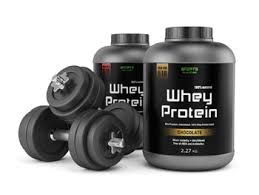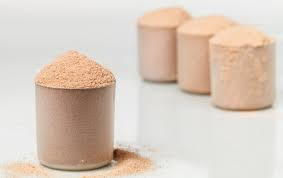What is Casein Protein?
Derived from milk, like whey protein, casein is a naturally more abundant source of branched-chain amino acids . I guess that’s why it’s sometimes simply called “milk protein,” since around 80 percent of the protein found in cow’s milk is casein — and it also makes up 20 to 40% of human breast milk. It’s also abundant in raw sheep cheese, a pure source of casein.
Casein, like whey and other protein foods , is made up of various “building blocks” called essential and non-essential amino acids. The human body is able to make certain amino acids on its own (called non-essential) while others it cannot (called essential), making the essential kinds crucial to get through the foods you eat. Since plant foods don’t always provide the complete set of essential amino acids we need, animal foods — and sometimes convenient protein powders — are one way people make sure they cover their protein bases.
Casein protein powder is created in a lab from dehydrating parts of milk — the problem is that many forms are denatured and isolated, and may cause health issues. It is advisable to find casein protein that is from A2 beta-casein rather than A1 casein (see “Different Types of Casein Protein” below). You can usually find it in most good fitness and might come across a variety of flavors. What you’ll probably notice is that for every brand of casein protein powder available, about five different whey protein powders are also sold.
So what are the benefits of casein-protein?
LONGER LASTING:
Not all proteins are created equal. Whether it’s soy, egg, whey, animal, or casein protein, they all have their own unique advantages. Arguably, casein’s greatest strength is timing. Casein has the ability to provide your bloodstream with a slow and steady flow of amino acids that could last for hours. Muscles may not be built overnight, but drinking a glass of casein-rich milk is the ideal protein to consume right before bed, as it’ll be more helpful throughout the night than any other protein option.
GREATER GAINS
Want to build massive muscles quicker?
According to a Texas study , casein may be an important ingredient to this. Researchers took 36 males performing
heavy resistance training and found that the group consuming a whey and casein combination significantly outperformed participants who were given a combination of whey, BCAAs, and glutamine supplement. Over the course of the 10-week study, the whey and casein combination yielded the greatest increases in lean, fat-free mass. Why take only one form of protein when a combination yields much better results?
FAT LOSS:
Want to improve chances of muscle growth and fat loss? If so, you might be interested to know that a study conducted in the Netherlands found that by multiplying casein intake by two and a half times, participants were able to have a higher metabolic rate while sleeping and a better overall fat balance. Also of note is that satiety levels were 33% higher. In other words, by taking casein you’ll not only be increasing fat loss , but you’ll do so on a fuller stomach.
GREATER STRENGTH:
Ask any guy what his workout goals are and increased strength is almost always on the wish list. Often, to help get there quicker, people supplement using whey protein. In a Massachusetts study , researchers found that casein actually doubled the effect that whey protein had on legs, chest, and shoulder strength results. Researchers believe the reason for the significant difference was because of casein’s well-known anti-catabolic abilities. The next time you’re thinking of having a late-night snack, make it a casein shake.
DENTAL PROTECTION:
What makes you cringe more: The thought of the dental chair or the accompanying invoice? According to a study conducted in the United Kingdom, one way to help prevent a more expensive dental visit might be to consume casein. Their research found that casein proteins have the potential to reduce or prevent the effects of enamel erosion. So if you drink a lot of fruit juices, sweeteners or sugary substances, or just can’t kick the soft drink habit, at least consider protecting your teeth by adding some casein protein to your diet.
FOODS HIGH IN CASEIN:
While you can get casein from casein supplements you can also get a substantial amount from food sources. Casein is highest in dairy products like milk, cheese, cream, and yogurt and generally diary derivatives. Casein is also found in some fish like tuna, although in much smaller quantities than dairy products.
CASEIN CONTENT IN MILK:
Milk is one of the highest sources of casein available as roughly 80% of milk proteins are casein. So if you drink an 800mls glass of milk that has roughly 12 grams of protein, you get about 9.6 grams of casein based proteins. That is quite a lot!
WHAT ARE CASEIN HYDROLYSATE AND MICELLAR CASEIN?
MICELLAR CASEIN:
Micellar casein is the least adulterated form of supplemental casein. It is left in its “intact” molecular structure. This is important as it then is digested in a series of enzymatic and nonenzymatic processes in the body to encourage slow breakdown and absorption by the body.
HYDROLYZED CASEIN:
Hydrolyzed casein is simply micellar casein that has been broken down into smaller peptides by “hydrolyzing” the bonds. This process occurs just like it does in whey where it can be broken down using enzymes or acids. If you decide to go with hydrolyzed casein for some of the reasons we mention below, definitely go with the hydrolyzed as the acid makes it incredibly bitter.
Typically, hydrolyzed casein will be substantially more expensive than micellar casein due to the processing and extra steps in manufacturing. There doesn’t appear to be any magical properties of hydrolyzed casein over hydrolyzed whey. The magic of casein lies in the micellar form so speaking honestly, if you want something hydrolyzed go with a hydrolyzed whey.
Casein AND Whey
Although it might not fly off shelves quite as quickly as whey, casein protein is actually very similar to whey in more ways than one. Like whey, casein protein comes from dairy and is actually the primary protein found in cow’s milk. Unlike whey protein, however, it digests slower due to a complex interaction with stomach acids. This results in a slower release of essential proteins and amino acids, which makes casein the preferred supplement in situations when a slow release of nutrients is beneficial (like before bed when you’re going 7-10 hours without food).
This same benefit is also thought to make casein protein a less optimal supplement post-workout (when you want nutrients quickly). However, research indicates this might not be as big of a deal as we thought. In many cases, whey and casein can be interchangeable , St. Pierre says. “Honestly, it’s pretty much an equal substitute. The research that compares whey to caseins post-workout is equivocal,” he says. You can stock up on both. But, according to St. Pierre, “Your total protein intake far outweighs anything else.” While that total amount will vary from person to person, the experts at Precision Nutrition recommend taking in 0.6-0.9 grams per pound of bodyweight depending on activity levels (more active individuals need more protein).
Casein Protein vs. Whey Protein
For athletes, or really anyone who’s pretty active, protein is an important piece of the puzzle when it comes to muscle recovery, repairment and growth. While most people living in developed nations are far from suffering a protein deficiency, keep in mind that protein requirements increase the more active you become, and they’re especially high when you regularly lift weights or do other types of lengthy training.
While you might think that protein powders are only for serious lifters, bulky men or pro athletes, nearly everyone can benefit from supplementing workouts with the right mix of nutrients — and protein powders simply make this easier to do.
Whey protein and casein protein also differ in terms of their bioavailability and effects on muscle synthesis. Although whey protein has many of the same benefits, it’s believed to cause more of a fast “amino acid spike” compared to casein. When the body is flooded with more protein that it can use at one time, it’s possible for some to be flushed out through urine, oxidized or generally wasted.
However, this isn’t always a bad thing — different types of proteins have their upsides — so don’t go writing off whey protein just yet. There are certainly benefits to consuming both faster- and slower-releasing proteins; it really just comes down to your goals and schedule.
At the molecular level, within a protein source like casein various amino acids are branched together. Casein protein has a lower percentage of branched-chain amino acid compared to whey protein, which is one reason it’s slower to digest and also tends to work for longer. Because of its utilization and timing, casein increases protein synthesis a bit less than whey does.
On the plus side, it better stops the body from breaking down amino acids it already has available within your muscles. Whey protein also has more sulfur than casein, which can also change the way the body uses it. Compared to casein, whey is a fast protein source, which means it provides amino acids quickly after ingestion — however they also leave the body sooner than when you consume casein.
In theory, the two should work differently to affect body composition, however not every study has shown this to be true. For example, researchers from the Metabolism Unit at the University of Texas Medical Branch found that short-term ingestion of both whey and casein after exercise resulted in similar increases in muscle protein net balance. They didn’t actually result in differences in muscle protein synthesis despite different patterns of blood amino acid responses.
If all of this chemistry seems a bit confusing, here’s the bottom line on casein vs. whey. Both casein and whey protein can supplement your workouts well and include all the essential amino acids you need, but whey has more branched-chain amino acids and, therefore, might be slightly better at facilitating muscle protein synthesis.
The good news is this: After comparing the effects of both proteins on body composition and performance in female athletes, researchers from the Exercise and Performance Nutrition Laboratory at the University of South Florida found that whey and casein had similar positive effects. Females were found to experience benefits using both supplements, including an increase in performance markers from consuming protein after resistance training and a decreased body fat composition.
SOURCES:
https://www.muscleandstrength.com/expert-guides/casein-protein
http://dailyburn.com/life/health/best-protein-powder-whey-casein-vegan/
http://www.mensfitness.com/nutrition/supplements/5-benefits-of-casein-protein



